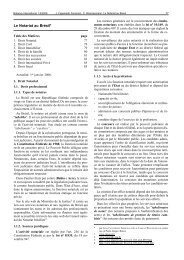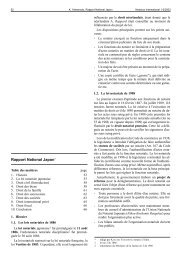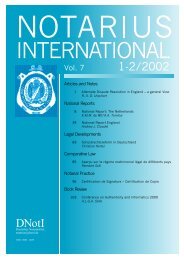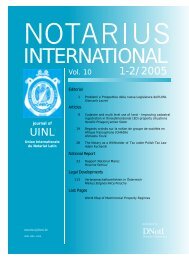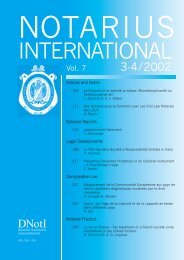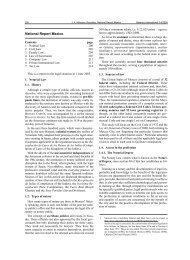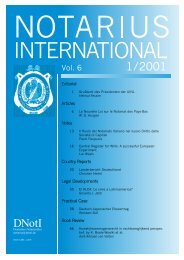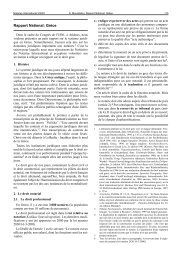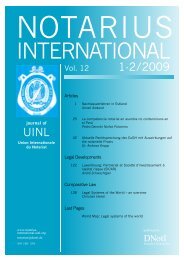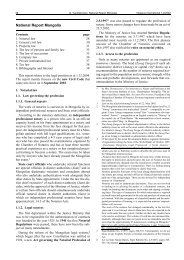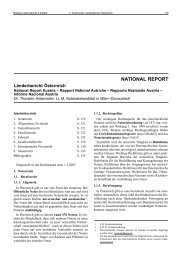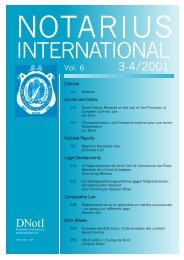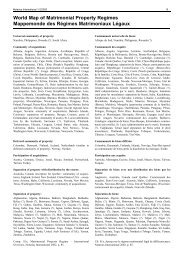Create successful ePaper yourself
Turn your PDF publications into a flip-book with our unique Google optimized e-Paper software.
<strong>Notarius</strong> <strong>International</strong> 3-4/<strong>2005</strong> D. Ockl, Protection of the Purchaser of Immovables to be built in Italy 151<br />
struction has not been completed to a stage enabling the<br />
certificate of viability to be issued (art. 1 (d) of the legislative<br />
decree).<br />
The following are excluded from the rules on protection:<br />
- the purchaser of buildings in respect of which building<br />
permission has not yet been sought or in respect of<br />
which there is no other notice or approval, and in respect<br />
of which the building plans have been drawn up<br />
by the vendor but have yet to be submitted to the competent<br />
municipal offices;<br />
- the purchaser of buildings in respect of which issuance<br />
of a certificate of viability (certificato di agibilità) has<br />
already been sought inasmuch as the buildings have<br />
also been completed in regard to finishings.<br />
The legislation applies whenever the immovable to be<br />
built is governed by the contract in a manner which may<br />
be described as dynamic: where, that is to say, the builder<br />
vendor undertakes to complete the construction of the<br />
building and transfer of title is deferred to the time of<br />
completion which will occur under the care of the vendor.<br />
Conversely, the legislation does not apply when the<br />
property passes under a contract which may be described<br />
as static, that is to say where the vendor sells with immediate<br />
effect an unfinished property and it is left to<br />
the purchaser to finish it.<br />
4.3 Requirements with regard to the type of contract<br />
The new legislation applies to contracts whose object is<br />
the deferred transfer of title or other right in rem over<br />
an immovable yet to be built, such as for example:<br />
- preliminary contract for the sale of a building to be built<br />
(sale of a future item, Article 1472 of the Civil Code),<br />
- sale of a building in course of construction in the ownership<br />
of third parties (sale of an item belonging to another,<br />
Article 1478 of the Civil Code),<br />
- exchange of area with a unit to be built (exchange of<br />
an existing item with a future item),<br />
- sale and purchase with reservation of title (Art. 1523<br />
of the Civil Code).<br />
5. The guarantee<br />
By way of protection for the purchaser, the decree lays<br />
down in Articles 2 and 3 an obligation on the builder to<br />
provide a guarantee securing all the sums or in any<br />
event amounts received or to be received by the builder<br />
until transfer of title in the property or other right in rem.<br />
That guarantee must afford restitution of sums paid and<br />
of the value of any other amounts received in the event<br />
that the builder enters a situation of crisis.<br />
The guarantee must be issued by a bank, an insurance<br />
company or other financial intermediary authorised in<br />
that behalf and must also provide for a waiver of preventive<br />
enforcement against the principal debtor, as mentioned<br />
in Article 1944, second indent of the Civil Code.<br />
The contract must mention the terms and conditions of<br />
the guarantee.<br />
The following are excluded from the guarantee obligation:<br />
- sums in respect of which it is provided that they are to<br />
be granted by a lending institution (the situation in<br />
which the loan granted to the purchaser is guaranteed<br />
by a mortgage secured on the property granted by the<br />
builder as the third-party mortgagor).<br />
- public contributions already supported by a separate<br />
guarantee.<br />
If a guarantee is not issued the decree (art. 2) provides<br />
that the contract shall be null and void. However, nullity<br />
may be relied on only by the protected purchaser<br />
and not by the builder.<br />
The guarantee ceases to be effective on transfer of title<br />
to, or of other right in rem in the property, or on the definitive<br />
act of assignment (Art. 3 (7) of the decree).<br />
The guarantee may be enforced as from the date on<br />
which the builder vendor is established as being in a situation<br />
of crisis, provided that:<br />
- in the event of registration of distraint concerning the<br />
property in question, the purchaser has given notice to<br />
the builder of his desire to rescind the contract;<br />
- in cases where the judgment declaratory of bankruptcy<br />
or other liquidation procedure is published, the competent<br />
authority under that procedure has not communicated<br />
an intention of taking over the preliminary<br />
contract.<br />
A crisis situation is defined as the situation occurring in<br />
cases where the builder is subjected or has been subjected<br />
to a writ of execution over land in relation to to the<br />
property under the contract, or to bankruptcy, extraordinary<br />
administration, preventive arrangement with creditors,<br />
compulsory admininstrative liquidation. (Article 1<br />
(c) of the decree).<br />
6. Contents of the contract<br />
6.1 Preliminary contract<br />
Article 6 of the decree establishes that the preliminary<br />
contract or any other contract directed at the subsequent<br />
acquisition by a natural person of the property or of any<br />
other right in rem over an immovable yet to be built, must<br />
contain:<br />
a) the particulars provided for in Article 2659, first indent,<br />
point 1)<br />
- (surname and forename, place and date of birth and tax<br />
code number of the parties, together with, if they are<br />
married, details of the regime governing the conjugal<br />
assets, in accordance with the particulars of their declaration<br />
or in a certificate issued by the registrar of civil<br />
status;<br />
- the name or company name, the registered office and<br />
the tax code number of the legal persons, of the companies<br />
provided for in Chapters II, III and IV of Title V<br />
of the Vth book and of non-recognised associations,<br />
with particulars, in regard to the latter and for ordinary<br />
companies, of the persons which represent them under<br />
the terms of the deed of incorporation;



